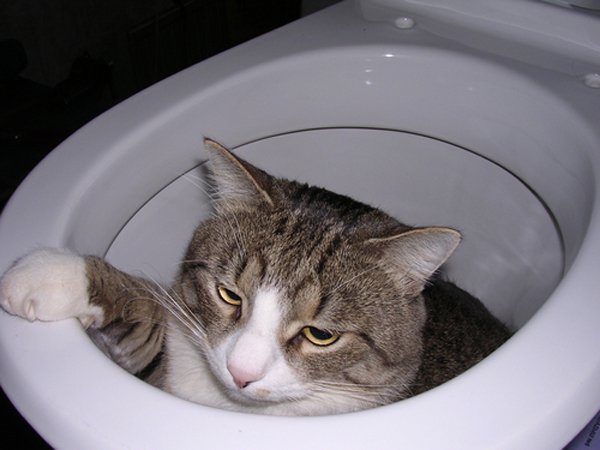The Consequences of Flushing Cat Poop Down Your Toilet - Protect Your Pipes
The Consequences of Flushing Cat Poop Down Your Toilet - Protect Your Pipes
Blog Article
Listed here in the next paragraph you can locate additional wonderful information about Can You Flush Cat Poop Down The Toilet?.

Intro
As feline owners, it's necessary to be mindful of just how we take care of our feline close friends' waste. While it might seem convenient to purge feline poop down the toilet, this technique can have damaging consequences for both the setting and human health and wellness.
Alternatives to Flushing
Fortunately, there are more secure and much more liable ways to take care of feline poop. Take into consideration the following choices:
1. Scoop and Dispose in Trash
The most typical method of taking care of pet cat poop is to scoop it right into a biodegradable bag and toss it in the garbage. Make certain to use a committed clutter scoop and dispose of the waste immediately.
2. Usage Biodegradable Litter
Opt for biodegradable feline litter made from products such as corn or wheat. These trashes are environmentally friendly and can be safely thrown away in the garbage.
3. Bury in the Yard
If you have a yard, consider burying feline waste in a marked location away from veggie yards and water sources. Be sure to dig deep enough to stop contamination of groundwater.
4. Install a Pet Waste Disposal System
Purchase a pet dog waste disposal system specifically created for cat waste. These systems make use of enzymes to break down the waste, decreasing smell and environmental influence.
Health Risks
Along with ecological issues, purging cat waste can likewise posture health risks to human beings. Cat feces may consist of Toxoplasma gondii, a bloodsucker that can cause toxoplasmosis-- a potentially serious ailment, specifically for pregnant ladies and people with damaged body immune systems.
Ecological Impact
Purging cat poop introduces damaging microorganisms and bloodsuckers right into the water system, posturing a substantial threat to marine ecological communities. These impurities can adversely affect marine life and compromise water quality.
Conclusion
Liable pet dog possession extends beyond supplying food and sanctuary-- it also involves appropriate waste monitoring. By refraining from purging feline poop down the commode and choosing alternative disposal approaches, we can lessen our ecological impact and protect human health and wellness.
Why Can’t I Flush Cat Poop?
It Spreads a Parasite
Cats are frequently infected with a parasite called toxoplasma gondii. The parasite causes an infection called toxoplasmosis. It is usually harmless to cats. The parasite only uses cat poop as a host for its eggs. Otherwise, the cat’s immune system usually keeps the infection at low enough levels to maintain its own health. But it does not stop the develop of eggs. These eggs are tiny and surprisingly tough. They may survive for a year before they begin to grow. But that’s the problem.
Our wastewater system is not designed to deal with toxoplasmosis eggs. Instead, most eggs will flush from your toilet into sewers and wastewater management plants. After the sewage is treated for many other harmful things in it, it is typically released into local rivers, lakes, or oceans. Here, the toxoplasmosis eggs can find new hosts, including starfish, crabs, otters, and many other wildlife. For many, this is a significant risk to their health. Toxoplasmosis can also end up infecting water sources that are important for agriculture, which means our deer, pigs, and sheep can get infected too.
Is There Risk to Humans?
There can be a risk to human life from flushing cat poop down the toilet. If you do so, the parasites from your cat’s poop can end up in shellfish, game animals, or livestock. If this meat is then served raw or undercooked, the people who eat it can get sick.
In fact, according to the CDC, 40 million people in the United States are infected with toxoplasma gondii. They get it from exposure to infected seafood, or from some kind of cat poop contamination, like drinking from a stream that is contaminated or touching anything that has come into contact with cat poop. That includes just cleaning a cat litter box.
Most people who get infected with these parasites will not develop any symptoms. However, for pregnant women or for those with compromised immune systems, the parasite can cause severe health problems.
How to Handle Cat Poop
The best way to handle cat poop is actually to clean the box more often. The eggs that the parasite sheds will not become active until one to five days after the cat poops. That means that if you clean daily, you’re much less likely to come into direct contact with infectious eggs.
That said, always dispose of cat poop in the garbage and not down the toilet. Wash your hands before and after you clean the litter box, and bring the bag of poop right outside to your garbage bins.
https://trenchlesssolutionsusa.com/why-cant-i-flush-cat-poop/

As a serious reader about How to Dispose of Cat Poop and Litter Without Plastic Bags, I imagined sharing that excerpt was important. Are you aware of anybody else who is interested in the subject? Do not hesitate to share it. I appreciate reading our article about Can You Flush Cat Poop Down The Toilet?.
Book With Us Today! Report this page